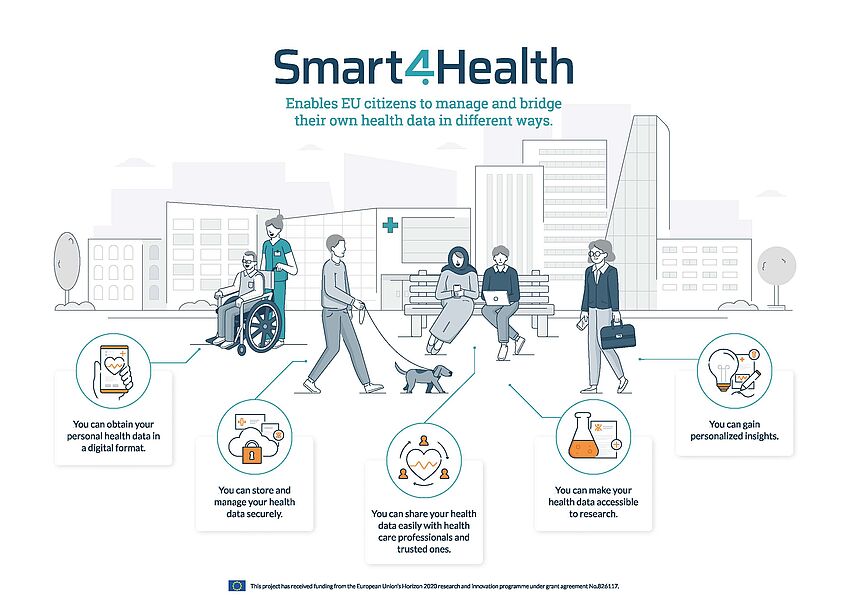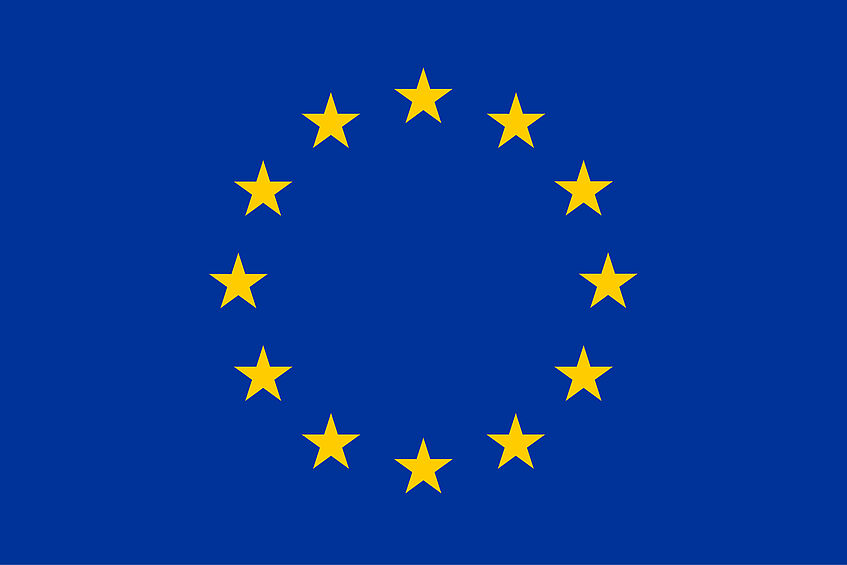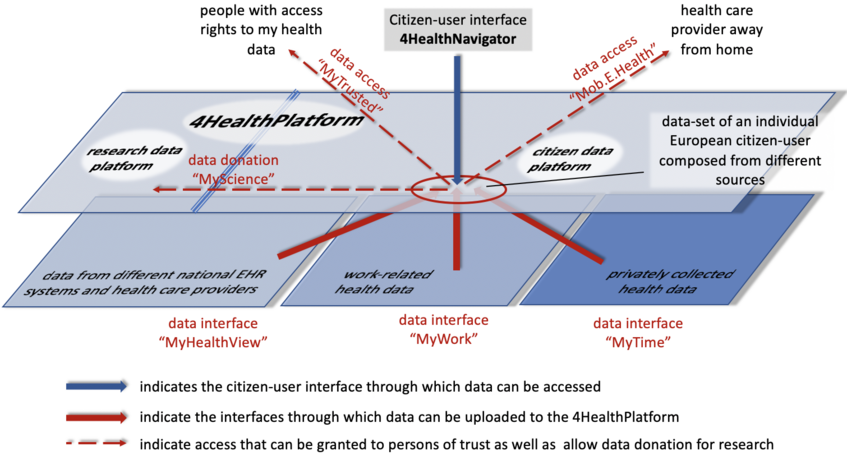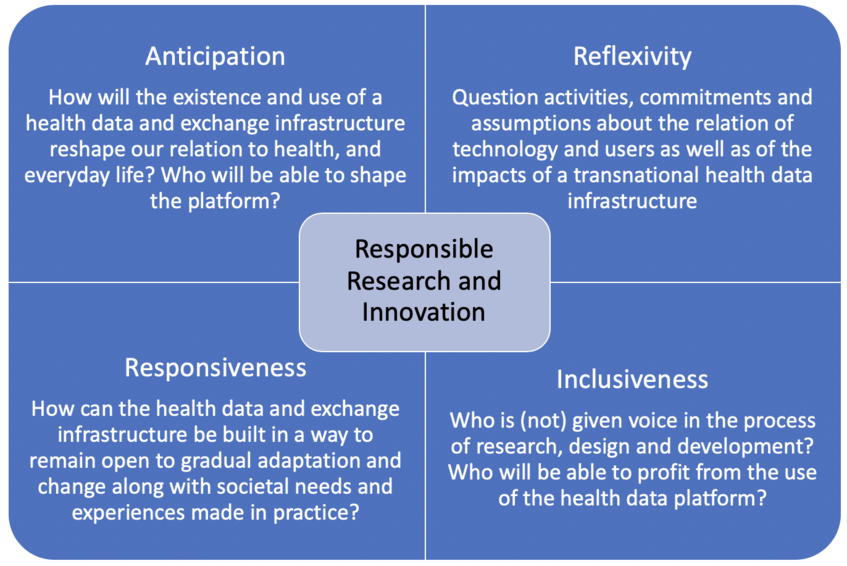Duration 01.01.2019 – 28.02.2023
Smart4Health: Citizen-centred EU-EHR exchange for personalised health
Team: Ulrike Felt (PI), Susanne Öchsner, Ekaterina Osipova, Robin Rae, Laura Kunz, Harry Wynands, Laura Bomm
Funding: Horizon 2020

Project Description
The Horizon2020 project Smart4Health aims at developing, testing and validating a health data platform prototype, enabling EU Citizens to be active participants in managing their own health. The key objective of Smart4Health is to place the citizen in the centre of decisions with regard to their own healthcare by enabling the possibility of sharing health data with different clinicians, medical centers, local and international societies, for research activities as well as to engage directly with healthcare providers.
It will allow citizens to upload data from three different kinds of sources (see Figure): (1) national electronic health records as well as records from other health care providers; (2) health-related data that are collected in the context of work environments; as the empirical case this project uses to build the prototype is backpain, this would for example be data from wearables or physiotherapeutic treatments; and (3) privately collected health-related data (produced through personal tracking devices, health apps, …). The platform should also give citizens the option to share their data with trusted people as well as to provide them for research purposes.
Smart4Health puts European citizens center stage – conceptually and methodologically. If the health data infrastructure is supposed to empower users and citizens that care for their health, then we need to understand e.g. how users conceptualize possibilities, what issues and concerns they voice, and which rights and obligations for such “health-data related citizens” are being embedded into the infrastructure. Producing an adequate solution for a portable, interoperable citizen health data platform prototype will therefore proceed in a process of co-creation/co-design involving citizens as well as diverse health-care professionals.Through this approach, future users are put in the position of (1) playing a central role in identifying problems and needs; (2) expressing values and concerns; (3) proposing requirements to be met; and (4) being involved in the testing when gradually building the proto-type platform.
Our team is specifically responsible for addressing the societal aspects of the project. In particular, we will take care of organizing a process of co-creation/co-design. In order to achieve this “citizen-centredness”, the development process will concretely engage with users in eight so-called Citizen Use Cases involving citizen users, professional users (doctors, nurses, physiotherapists) and other stakeholders (e.g. hospitals, national EHR providers) in different countries and empirical settings. They serve as case studies for the citizen-centered development, testing and evaluating the platform prototype and the different data areas and data practices that will be available to them.
The research and innovation process in Smart4Health will follow the four dimensions of the Responsible Research and Innovation approach — anticipation, reflexivity, inclusiveness and responsiveness. This will be realised through organizing the process in a cyclical manner containing five interconnected steps (see Figure). This assures to include users and reflects the complexity of the endeavor in an adequate manner. Going through these different steps comes with specific attention to integrating different concerns, needs, expectations and positions and regular feedback loops. It thus means to turn the research, development and design processes into more transparent, interactive processes by which societal actors such as patients and citizens, professional users and platform developers can become mutually responsive to each other.
Research Team
- Ulrike Felt
- Susanne Öchsner
- Ekaterina Osipova (from 01/2022)
- Robin Rae
Former team member
- Luca Lindner (until 12/2021)
MOOC on Health Data Journeys
In recent years, Digital Health has become a key topic on the policy agenda across the industrialized world. It is put forward as an answer for the health care system, e.g., to problems of an aging population and the need for better and more efficient health care. At the same time, citizens are asked to get more engaged in caring for their data through collecting and curating their data and using them to adapt their health-related behaviour. Finally, medical and nursing research increasingly builds its advances on the access to patient data and, thus, citizens are called to contribute to research through providing their data.
This course consists of two parts and will introduce you to the possibilities that Digital Health opens up for contemporary societies but will also point to some potential challenges. By attending the course, you will be able to engage with the question of how personal health data travel, where they come to matter, which choices you have as citizens and what potential challenges need to be considered. Experts in social sciences will address social and ethical questions that potentially arise and how one could reflect on them. The course will also contain voices from citizens and let them share their reflections and concerns.
Course date: Open to all; no specific course date
Course language: German with English subtitles
Wenn Daten reisen - Auf dem Weg in einen digitalen europäischen Gesundheits(daten)raum
Teil 1 - Daten sammeln und ordnen
Data Journeys – Towards a European Health (Data) Space
Part 1 – Collecting and Organizing Data
Publications
- "Social Sciences and Humanities Framework" (Deliverable D1.1) gives a broader vision of the project framing and the kinds of questions that need to be asked in the context of such a project.
- "Report on the methodological design of the co-creation environment" (Deliverable D1.2)
- "1st Specification of user requirements and performance criteria" (Deliverable D1.3)
- "1st Citizen/User Consent Language Report" (Deliverable D1.4)
- "2nd Specification of user requirements and performance criteria" (Deliverable D1.5)
- "3rd Specification of user requirements and performance criteria" (Deliverable D1.6)
- Felt U, Öchsner S, Rae R. The Making of Digital Health: Between Visions and Realizations. in Digitaler Humanismus. Menschliche Werte in der virtuellen Welt. Münster: Waxmann Münster. 2020. S. 89-101. (University - Society - Industry: Beiträge zum lebensbegleitenden Lernen und Wissenstransfer, Band 9).
- Felt, U., Öchsner S., and Rae, R. 2022. "Citizens in Search for a Place in the Digital Health Data Space: A Case Study." In Stud Health Technol Inform 293: 127-136. doi.org/10.3233/SHTI220359. www.ncbi.nlm.nih.gov/pubmed/35592972.
Social media
- twitter @4healthEU
- facebook @4healthEU
- linkedin smart4health
Coordinators
- Ricardo Gonçalves Uninova - Instituto de Desenvolvimento de Novas Tecnologias for administrative coordination
- Erwin Böttinger, Hasso-Plattner-Institute for the scientific/technical coordination.

This project has received funding from the European Union's Horizon 2020 research and innovation programme under the grant agreement No 826117.



